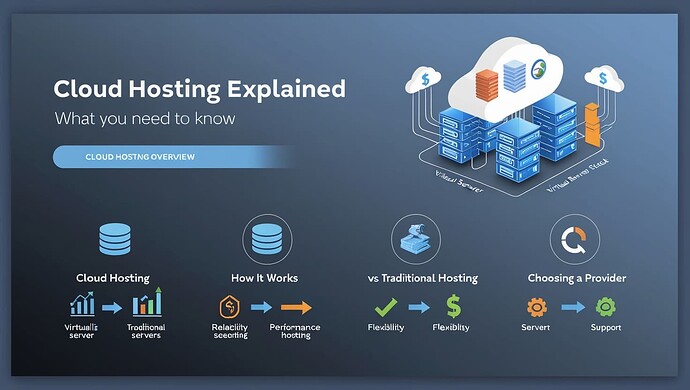In today’s digital landscape, cloud hosting has become a popular choice for businesses and individuals looking for reliable and scalable web hosting solutions. But what exactly is cloud hosting, and how does it differ from traditional hosting methods? This post will break down cloud hosting, its benefits, and why it might be the right choice for you.
What is Cloud Hosting?
Cloud hosting is a type of web hosting that uses a network of virtual servers, or a “cloud,” to store and manage data. Unlike traditional hosting, where your website is hosted on a single physical server, cloud hosting distributes resources across multiple servers. This network of servers works together to ensure your website’s performance, reliability, and scalability.
How Cloud Hosting Works
Cloud hosting operates on a virtualized infrastructure, utilizing a cluster of servers that are interconnected. Here’s how it works:
- Virtualization: Cloud hosting uses virtualization technology to create virtual servers from physical hardware. Each virtual server functions independently, allowing for efficient resource allocation and management.
- Distributed Resources: Your website’s data is spread across multiple servers. If one server fails or experiences high traffic, other servers can take over, ensuring minimal downtime and consistent performance.
- Scalability: Cloud hosting allows for on-demand resource scaling. If your website experiences a sudden spike in traffic, additional resources can be allocated instantly, preventing performance issues.
Benefits of Cloud Hosting
- Scalability: One of the most significant advantages of cloud hosting is its scalability. You can easily scale your resources up or down based on your needs, ensuring optimal performance during peak times without overpaying during quieter periods.
- Reliability: With cloud hosting, your website’s data is stored across multiple servers. This redundancy means that if one server fails, your website can continue to operate smoothly using resources from other servers. This minimizes the risk of downtime and ensures high availability.
- Performance: Cloud hosting offers improved performance due to its ability to distribute resources across multiple servers. This can result in faster load times and a better overall user experience.
- Cost-Effectiveness: Cloud hosting often operates on a pay-as-you-go model, where you only pay for the resources you use. This can be more cost-effective than traditional hosting, where you might pay for more resources than you need.
- Flexibility: Cloud hosting provides flexibility in managing your resources and applications. You can deploy and manage various applications and services with ease, making it a versatile solution for different needs.
Cloud Hosting vs. Traditional Hosting
- Traditional Hosting: Typically involves shared, VPS, or dedicated servers. Resources are limited to the capacity of a single server, which can lead to performance issues if the server is overloaded or fails.
- Cloud Hosting: Utilizes a network of interconnected servers, offering greater flexibility, scalability, and redundancy. Resources are dynamically allocated based on demand, leading to more reliable performance.
Choosing the Right Cloud Hosting Provider
When selecting a cloud hosting provider, consider the following factors:
- Performance: Look for providers with a proven track record of high performance and reliability.
- Scalability: Ensure the provider offers flexible scaling options to accommodate your growth.
- Security: Check for robust security features and compliance with industry standards.
- Support: Evaluate the level of customer support and resources available to assist with any issues.
Conclusion
Cloud hosting is a powerful and flexible solution that offers numerous benefits, including scalability, reliability, and performance. By leveraging a network of virtual servers, cloud hosting can provide a more resilient and cost-effective hosting experience compared to traditional methods. If you’re looking for a hosting solution that can grow with your needs and deliver consistent performance, cloud hosting might be the perfect fit for you.
